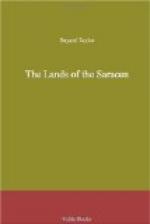The remaining twenty miles or more of the road to Malaga follow the line of the coast, passing headlands crowned by the atalayas, or watch-towers, of the Moors. It is a new road, and practicable for carriages, so that, for Spain, it may be considered an important achievement. The late rains have, however, already undermined it in a number of places. Here, as among the mountains, we met crowds of muleteers, all of whom greeted me with: “Vaya usted con Dios, caballero!”—("May you go with God, cavalier!”) By this time, all my forgotten Spanish had come back again, and a little experience of the simple ways of the people made me quite at home among them. In almost every instance, I was treated precisely as a Spaniard would have been, and less annoyed by the curiosity of the natives than I have been in Germany, and even America.
We were still two leagues from Malaga, at sunset, The fishermen along the coast were hauling in their nets, and we soon began to overtake companies of them, carrying their fish to the city on donkeys. One stout, strapping fellow, with flesh as hard and yellow as a sturgeon’s, was seated sideways on a very small donkey, between two immense panniers of fish, As he trotted before us, shouting, and slapping the flanks of the sturdy little beast, Jose and I began to laugh, whereupon the fellow broke out into the following monologue, addressed to the donkey: “Who laughs at this burrico? Who says he’s not fine gold from head to foot? What is it that he can’t do? If there was a mountain ever so high, he would gallop over it. If there was a river ever so deep, he would swim through it If he could but speak, I might send him to market alone with the fish, and not a chavo of the money would he spend on the way home. Who says he can’t go as far as that limping horse? Arrrre, burrico! punate—ar-r-r-r-r-e-e!”
We reached Malaga, at last, our horses sorely fagged. At the Fonda de la Alameda, a new and very elegant hotel, I found a bath and a good dinner, both welcome things to a tired traveller. The winter of Malaga is like spring in other lands and on that account it is much visited by invalids, especially English. It is a lively commercial town of about 80,000 inhabitants, and, if the present scheme of railroad communication with Madrid is carried out, must continue to increase in size and importance. A number of manufacturing establishments have lately been started, and in this department it bids fair to rival Barcelona. The harbor is small, but good, and the country around rich in all the productions of temperate and even tropical climates. The city contains little to interest the tourist. I visited the Cathedral, an immense unfinished mass, without a particle of architectural taste outwardly, though the interior has a fine effect from its large dimensions.




